牛津版七上全册重点单词 短语 语法
七年级英语上册知识点牛津
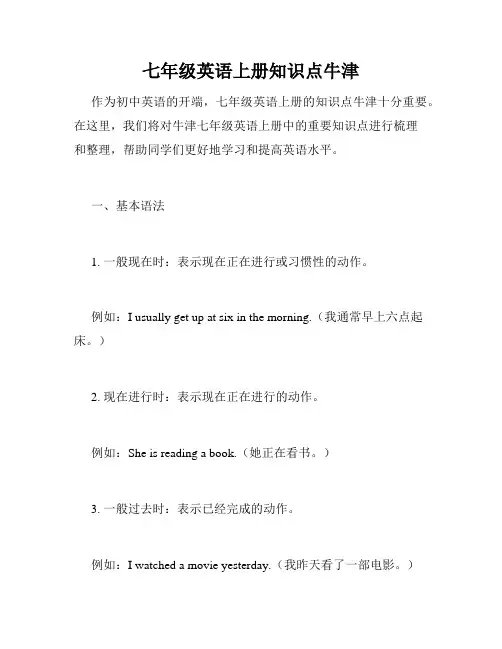
七年级英语上册知识点牛津作为初中英语的开端,七年级英语上册的知识点牛津十分重要。
在这里,我们将对牛津七年级英语上册中的重要知识点进行梳理和整理,帮助同学们更好地学习和提高英语水平。
一、基本语法1. 一般现在时:表示现在正在进行或习惯性的动作。
例如:I usually get up at six in the morning.(我通常早上六点起床。
)2. 现在进行时:表示现在正在进行的动作。
例如:She is reading a book.(她正在看书。
)3. 一般过去时:表示已经完成的动作。
例如:I watched a movie yesterday.(我昨天看了一部电影。
)4. 现在完成时:表示已经完成的动作对现在造成的影响。
例如:I have finished my homework.(我已经完成了我的作业。
)5. 现在完成进行时:表示从过去某时开始一直到现在正在进行的动作。
例如:I have been studying English for two hours.(我已经学了两个小时的英语。
)二、基本词汇1. 数字:one, two, three, four, five, six, seven, eight, nine, ten2. 人称代词和物主代词:I, you, he, she, it, we, they, me, you, him, her, it, us, them3. 颜色:red, blue, green, yellow, black, white4. 学科:math, science, history, geography, music, art, PE三、基本句型1. 陈述句:主语 + 谓语 + 宾语例如:I love English.(我爱英语。
)2. 疑问句:疑问词 + 动词 + 主语 + 其他信息例如:What is your name?(你叫什么名字?)3. 否定句:主语 + 动词 + not + 宾语例如:I do not like math.(我不喜欢数学。
完整版深圳牛津版英语七年级上重点词汇语法
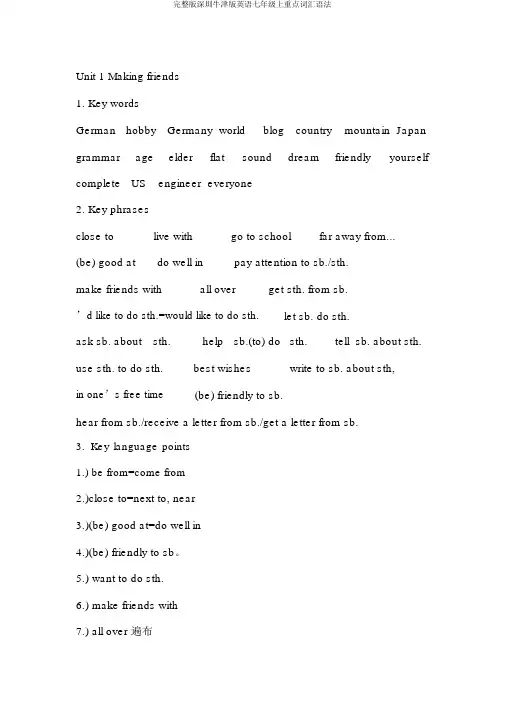
Unit 1 Making friends1. Key wordsGerman hobby Germany world blog country mountain Japan grammar age elder flat sound dream friendly yourself complete US engineer everyone2. Key phrasesclose to live with go to school far away from... (be) good at do well in pay attention to sb./sth.make friends with all over get sth. from sb.’d like to do sth.=would like to do sth.let sb. do sth.ask sb. about sth.help sb.(to) do sth.tell sb. about sth. use sth. to do sth.best wishes write to sb. about sth,in one’s free time(be) friendly to sb.hear from sb./receive a letter from sb./get a letter from sb.3.Key language points1.) be from=come from2.)close to=next to, near3.)(be) good at=do well in4.)(be) friendly to sb。
5.) want to do sth.6.) make friends with7.) all over 遍布8.)’d like to do sth=would like to do sth.would like sth.would like sb. to do sth.4.Key grammarA. 特别疑问句1.疑问词what where who how how old when why which whose what time(问时辰 )how long how far how soon多快how often how many how much2.特别疑问句组成:特别疑问词+一般疑问句B.不定冠词 a/anUnit 2 Daily life1. Key wordsdaily bell article ring never end table tennis band ride practice usually together so market seldom guitar Geography grade break start2. Key phrasesjunior high school on foot take part in have a good time go to bed get up talk about between A and B(be) late for school brush one’s teeth ride a bicycle make notes add sth. to sth.at the end of take turns to do sth.arrive at/inhelp sb. with sth.Keep a diary remember to do sth.enjoy/love doing sth.3.Key language points1.) enjoy(doing) sth.2.) love doing sth.3.) ride (rode ridden)4.) end v. /n.5.) practice n. practise v. practise doing sth.6.) (be) late for7.) on foot8.) go to bed去睡觉go to sleep睡着了4.Key grammarA. 一般此刻时1.当谓语动词为实义动词时:一定句、否认句、疑问句、回答2.当谓语动词为 be 动词时:一定句、否认句、疑问句、回答B.频度副词和副词短语的使用1、频度副词使用时一般放在动词前always usually often sometimes seldom never2、频度副词短语使用时一般放在句末every day once a week twice a week all the time five times a year at the weekend every day/night/year/month...一、一般此刻时:【No. 1】一般此刻时的功能1.表示事物或人物的特点、状态。
牛津译林版七年级上册(2024)Unit 4 School day 语言点和语法点整理
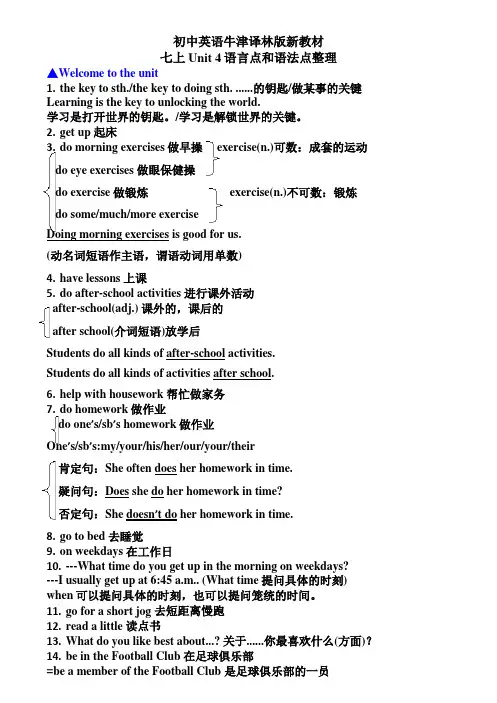
初中英语牛津译林版新教材七上Unit 4语言点和语法点整理▲Welcome to the unit1.the key to sth./the key to doing sth. ......的钥匙/做某事的关键Learning is the key to unlocking the world.学习是打开世界的钥匙。
/学习是解锁世界的关键。
2.get up 起床3.do morning exercises做早操 exercise(n.)可数:成套的运动 do eye exercises 做眼保健操do exercise 做锻炼 exercise(n.)不可数:锻炼do some/much/more exerciseDoing morning exercises is good for us.(动名词短语作主语,谓语动词用单数)4.have lessons 上课5.do after-school activities 进行课外活动after-school(adj.) 课外的,课后的after school(介词短语)放学后Students do all kinds of after-school activities.Students do all kinds of activities after school.6.help with housework 帮忙做家务7.do homework做作业do one’s/sb’s homework做作业One’s/sb’s:my/your/his/her/our/your/their肯定句:She often does her homework in time.疑问句:Does she do her homework in time?否定句:She doesn’t do her homework in time.8.go to bed 去睡觉9.on weekdays 在工作日10.---What time do you get up in the morning on weekdays?---I usually get up at 6:45 a.m.. (What time提问具体的时刻) when可以提问具体的时刻,也可以提问笼统的时间。
牛津译林英语七年级上册U1-U4必背短语全
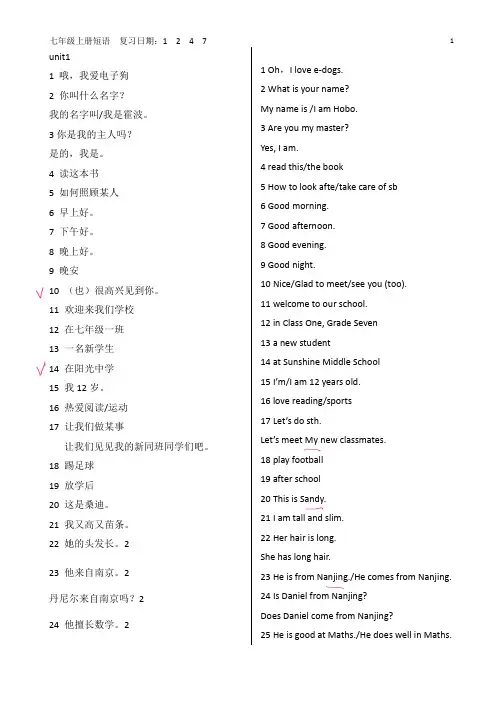
unit11 哦,我爱电子狗2 你叫什么名字?我的名字叫/我是霍波。
3你是我的主人吗?是的,我是。
4 读这本书5 如何照顾某人6 早上好。
7 下午好。
8 晚上好。
9 晚安10 (也)很高兴见到你。
11 欢迎来我们学校12 在七年级一班13 一名新学生14 在阳光中学15 我12岁。
16 热爱阅读/运动17 让我们做某事让我们见见我的新同班同学们吧。
18 踢足球19 放学后20 这是桑迪。
21 我又高又苗条。
22 她的头发长。
223 他来自南京。
2丹尼尔来自南京吗?224 他擅长数学。
21 Oh,I love e-dogs.2 What is your name?My name is /I am Hobo.3 Are you my master?Yes, I am.4 read this/the book5 How to look afte/take care of sb6 Good morning.7 Good afternoon.8 Good evening.9 Good night.10 Nice/Glad to meet/see you (too).11 welcome to our school.12 in Class One, Grade Seven13 a new student14 at Sunshine Middle School15 I’m/I am 12 years old.16 love reading/sports17 Let’s do sth.Let’s meet My new classmates.18 play football19 after school20 This is Sandy.21 I am tall and slim.22 Her hair is long.She has long hair.23 He is from Nanjing./He comes from Nanjing.24 Is Daniel from Nanjing?Does Daniel come from Nanjing?25 He is good at Maths./He does well in Maths.1 她的头发短吗?22热爱跳舞3擅长游泳2他擅长跑步吗?24他有许多爱好。
牛津译林版七年级英语上册全册重点句子及短语汇总
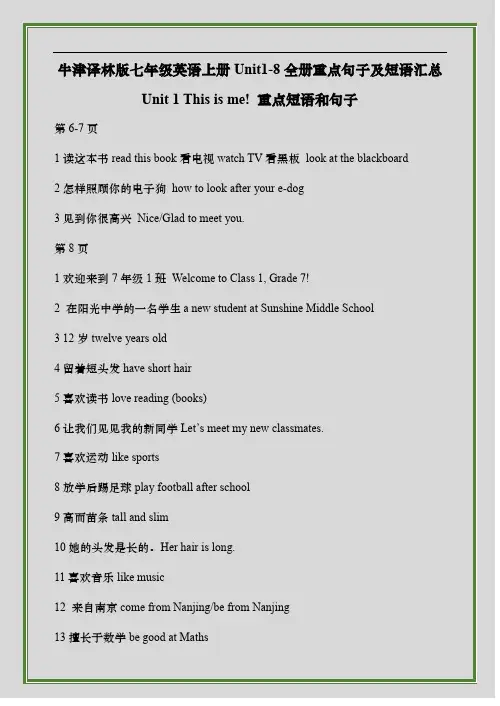
牛津译林版七年级英语上册Unit1-8全册重点句子及短语汇总Unit 1 This is me! 重点短语和句子第6-7页1读这本书read this book看电视watch TV看黑板look at the blackboard2怎样照顾你的电子狗how to look after your e-dog3见到你很高兴Nice/Glad to meet you.第8页1欢迎来到7年级1班Welcome to Class 1, Grade 7!2 在阳光中学的一名学生a new student at Sunshine Middle School3 12岁twelve years old4留着短头发have short hair5喜欢读书love reading (books)6让我们见见我的新同学Let’s meet my new classmates.7喜欢运动like sports8放学后踢足球play football after school9高而苗条tall and slim10她的头发是长的。
Her hair is long.11喜欢音乐like music12 来自南京come from Nanjing/be from Nanjing13擅长于数学be good at Maths第12页1在那边over there2我们的英语老师our English teacher我们的语文老师our Chinese teacher第13-14页1在一所新学校at a new school2有一些新朋友have some new friends3喜欢跳舞love dancing4擅长于游泳be good at swimming5喜欢我的新同学love my new classmates6我的ANDY表兄my cousin Andy7见到你很开心Glad to meet you.8我们的学校很漂亮。
译林版牛津初中英语七年级上册全册各单元词组、表达方式总结
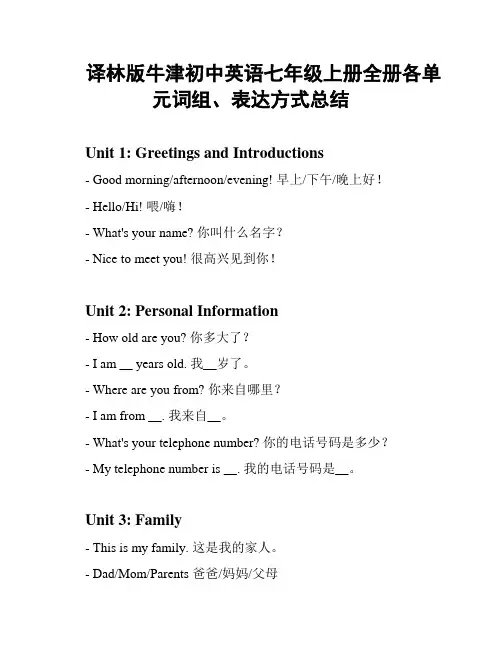
译林版牛津初中英语七年级上册全册各单元词组、表达方式总结Unit 1: Greetings and Introductions- Good morning/afternoon/evening! 早上/下午/晚上好!- Hello/Hi! 喂/嗨!- What's your name? 你叫什么名字?- Nice to meet you! 很高兴见到你!Unit 2: Personal Information- How old are you? 你多大了?- I am __ years old. 我__岁了。
- Where are you from? 你来自哪里?- I am from __. 我来自__。
- What's your telephone number? 你的电话号码是多少?- My telephone number is __. 我的电话号码是__。
Unit 3: Family- This is my family. 这是我的家人。
- Dad/Mom/Parents 爸爸/妈妈/父母- Brother/Sister 兄弟/姐妹- I have __ siblings. 我有__个兄弟姐妹。
- Who is this? 这是谁?Unit 4: School Life- I go to school by __. 我通过__去上学。
- My favorite subject is __. 我最喜欢的科目是__。
- We have __ classes every day. 我们每天有__节课。
- What time do you go to school? 你几点去上学?- I go to school at __. 我__去上学。
Unit 5: Daily Routine- I get up at __. 我__起床。
- I brush my teeth. 我刷牙。
- I have breakfast/lunch/dinner. 我吃早饭/午饭/晚饭。
牛津七年级上7单元重点短语和句型
牛津七年级上7单元重点短语和句型Unit seven, Shopping1. come with me 跟我来;come on 快点=hurry up ;2. need sb. to do sth. 需要某人做某事;want/need/plan to do sth. 想/需要/计划做某事;3. flower shop 花店;shoe shop鞋店;gift shop 礼品店;一般店前的名词作定语用单数形式,但以下店名词前用复数形式,这是特例,注意区分:clothes shop 服装店;sports shop 体育用品商店;4. go shopping = do some shopping = buy some things 购物/买东西;5. hate doing sth. 讨厌做某事,经常性的; hate to do sth. 讨厌做某事,偶尔、不经常;hate (sb.) to do sth. ;讨厌(某人)做某事;hate sb./sth. 讨厌某人/某事;hate;同义词为dislike; 反义词为:love; like;6. sb.+ be interested in (doing) sth. 对(做)…感兴趣;主语是人;sth.+ be interesting 主语是物;或interesting+sth. ;如an interesting book 作名词定语;7. make sure 确保 make sure of /about =make sure that = make sure to do sth. 弄清楚,查明;8. be sure 确信、相信;be sure of oneself 有自信心;for sure 的确;确实地;sb.+be sure of/about sth. = sb. +be sure +that从句;主语是人;sb./sth. +be sure to do sth. ;主语是物也可是人;注意区分:be sure of;be sure about;be sure that;be sure to do sth.;for sure;9. just a minute = just a moment稍等片刻;=wait a minute = wait a moment = wait for a short time ;at a moment =right now 此刻;立即;10. enough修饰(adj.); (adv.)时常放在(adj.); (adv.) 后面;如good enough ;11. enough修饰(n.) 时常放在(n.)前面;如enough money ;money;不可数;make money; 挣钱;pocket money; 零花钱;spend money like water挥金如土;句型:have enough money for sth. ;有足够的钱买某物;句型:(adj.)/(adv.) + enough to do sth. ;足够…可以做某事;12. wait to do sth. 等待做某事;can’t wait to do sth. 迫不及待地想要做某事;wait for等待;wait for sb. to do sth. 等待某人做某事;13. be different from与…不同;= not the same as;14. the same as 与…一样;15. another 又一,另一,用于三者或以上;16. one after another 一个接一个;17. one another = each other 互相;18. price用高、低(high, low)形容,不能用贵、便宜形容;cheap; 便宜的;反义词expensive; 昂贵的;或dear昂贵的;19. ask sb. for help 向某人寻求帮助;20. buy Simon a present 买给西蒙一个礼物;= buy a present for Simon 为西蒙买一个礼物;buy sb. sth. = buy sth. for sb.;cook sb. sth. = cook sth. for sb.;make sb. sth.= make sth. for sb.;请区别于:send/give/pass/show sb. sth. ;这些= send/give/pass/show sth. to sb.;但;collect sth. for sb. ;为某人收集某物;只有这一种形式。
七年级上册,牛津版知识点整理,7AU6知识点梳理
七年级上册牛津版知识点整理Unit 6 Different places1. peaceful ['pi:sful] adj.平静的【词性转换】peace [pi:s] n.和平It ’s peaceful at home when the children are at school.孩子们上学时,家里就安静了。
2. convenient [k n'vi:nj nt] adj.方便的【词性转换】convenience [k n'vi:nj ns] n.便利【反义词】inconvenient [.ink n'vi:nj nt] adj.不便的,有困难的When would it be convenient for you to go? 你什么时候方便去?3. neighbourhood ['neib hud] n.街区【词性转换】neighbour ['neib ] n.邻居4. bottom['b o t m] n.底部【反义词】top[t o p]n.顶部Some tea left at/in the bottom of your cup. 你杯底剩下一些茶。
5. steep [sti:p] adj.陡的【反义词】gentle ['d s entl] adj.暖和的There was a steep climb on the road out of town.城外的公路有一段陡坡。
6. step [step] n.台阶There are two steps up onto the bus. 上公共汽车有两级踏板。
7. noisy ['n o izi]adj.吵闹的;嘈杂的【词性转换】noise [n o iz]n.噪音noisily['n o izili]adv.吵闹地;嘈杂地【反义词】quiet ['kwai t] adj.安静的;宁静的Shanghai is sometimes a really noisy city. 上海有时候真的是一个嘈杂的城市。
牛津版七年级英语上册重点知识点复习资料
精品基础教育教学资料,仅供参考,需要可下载使用!Unit1 重要知识点1.love/like/enjoy doing sth 热爱/喜欢/享受做某事love/like to do sth2.a/the master of.... ....的主人3.Now,read this book. 祈使句,表达命令,请求,劝告,警告,禁止等。
否定:Don't+祈使句4.read-reading 动名词 Reading Club 阅读俱乐部5.look after=take care oflook after....well=take good care of.... 照顾好...look at 看向 see(看到实质内容)look for 寻找look out of.... 向...外看look up查阅6.the first day第一天7.welcome to spl.欢迎来到某地welcome to Class1(One),Grade7(Seven)in Class1,Grade7➡对班级/年级提问:What/Which class/grade +be+主语+in?8.年龄表达方式:主语+be+数词+year(s) old. I am 12 years old.=主语+be+数词 =I am 12.=主语+be+at the age of+数词 =I am at the age of 12. 对年龄提问:How old+be+主语? How old are you?=What’s sb’s age? =What’s your age?xx-year-old ....岁的 a 12-year-old girl 一位12岁的小女孩9.play+球类运动 play footballplay the+乐器名词 play the piano10.after class/school/lunch....11.be from=come from 来自Where +be+主语+from?=Where+助动词+主语+come from?12.be good at (doing ) sth=do well in (doing) sth 擅长做某事(=do sth well)13.★Be动词的一般现在时15.go walking➡go+v-ing=go for a walkgo swimming=go for a swim16.glad/nice to meet you. ➡It's glad/nice to meet you.It’s+adj.+to do sth做某事....17.I see.我明白了。
牛津译林版七年级英语上册重点短语、句子默写要点
牛津译林版七年级英语上册重点短语、句子默写要点Unit 1: This is Me!1."Look after" someone means to take good care of them.2."Some of the new students" refers to a few of the new students。
"One of" is used with a plural noun to refer to one item from the group。
"Many of" is used to refer to a large number of items from the group。
"Much of" is used with an uncountable noun to refer to a large amount of that noun.3."Introduce A to B" means to introduce person A to person B。
"Introduce yourself to the class" means to introduce yourself to everyone in the class。
The reflexive pronouns "myself"。
"yourself"。
"himself"。
"herself"。
"itself"。
"ourselves"。
"yourselves"。
and "themselves" are used to refer back to the subject of the sentence.4."Greet each other" means to say hello to one another.5."Good night" is used to say goodbye before going to sleep。
- 1、下载文档前请自行甄别文档内容的完整性,平台不提供额外的编辑、内容补充、找答案等附加服务。
- 2、"仅部分预览"的文档,不可在线预览部分如存在完整性等问题,可反馈申请退款(可完整预览的文档不适用该条件!)。
- 3、如文档侵犯您的权益,请联系客服反馈,我们会尽快为您处理(人工客服工作时间:9:00-18:30)。
Unit 1 This is me!Key phrases1. welcome to ... 欢迎到……2. good morning / afternoon / evening 早上/下午/晚上好3. Class 1, Grade 7 七年级一班4. a new student 一名新学生5. 12 years old 12岁6. have short hair 留着短发7. come from... 来自8. love dancing 喜欢跳舞9. cute baby 可爱的宝宝10. go home late 回家迟了11. all the lessons 所有的课程12. like sports 喜欢运动13.play football 踢足球14.after school 放学后15. tall and slim 又高又瘦16. comes / is from 来自……17. read this book 读这本书18.at school 在学校19. some new friends 一些新朋友20. listen to music 听音乐21. kite flying 放风筝22. play games 做游戏23. wear glasses 戴着眼镜Key sentences1. I love reading.Note: love后可跟名词,不定式或动词-ing。
意为“喜欢……”。
2. Now let’s meet my new classmates.Note: let’s 引导的祈使句,后跟动词原形,意思是“咱们做……吧。
”3. I often play football after school.Note: play 后接球类名词,表示“踢/打……球”;after 意为“在……后”,其后可接名词或动词-ing。
4. She is tall and slim.Note: and 常用来连接两个并列的单词、短语,可表示“和;又”。
值得注意的是,and 前后的词性要统一。
5. This is my cousin Andy.Note: This is 意为“这是……”,是用来向对方介绍别人的专用语。
6. I come from Nanjing, but now I live with my family in Beijing.Note: but 是连词,用来连接两个句子,意为“但是;却”,表示转折关系。
7. My hair is very short, and I wear glasses.Note: “My hair is very short”意为“我是短头发”,也可表达为“I have very shorthair”。
and 是连词,在这句话中,and连接了两个并列句。
Grammar in usebe 动词我们常使用be 动词的一般现在时谈论事实和状态。
具体怎样使用它呢?现在送你一则口诀,帮你牢记be动词的用法。
读完这个口诀,大家对be 动词有一定的了解了吧。
动词be一般不直接出现在句子中,它随主语人称的变化而变化。
如果主语是代词,be 动词与前面的主语可以缩写。
例如:1. I’m thirteen years old.我十三岁。
2. Peter is my new friend.彼得是我的新朋友。
3. They’re all from Xi’an.他们都来自西安。
be 动词一般现在时的否定句构成是在be后直接加not(可以缩写),其一般疑问句是把be 提到句首。
例如:4. She is not my sister.她不是我的姐姐。
5. — Are you Mary?你是玛丽吗?—No, I’m not.不,我不是。
6. — Is Tom good at singing?汤姆擅长唱歌吗?—No, he isn’t.不,他不擅长。
另外,am与not 之间一般不缩写。
在肯定回答中,主语和be 动词不能缩写。
如“Yes,they are.”不可缩写为“Yes, they’re.”。
Unit 2 Let's play sports!Key phrases1. play sports 做运动2. a new member of ……的新成员3. play tennis 打网球4. go swimming 去游泳5. look strong 看起来强壮6. come true 实现7. many of my students 我的许多学生8. play table tennis 打乒乓球9.talk about / of 谈论10.at / on weekends 在周末11.make me feel great 使我感觉很棒12. play football very well 踢足球踢得很好13. free time 空闲时间14. many times a day 一天很多次15. my favourite football star 我最喜欢的足球明星16. make him happy 使他开心17. the next World Cup 下一届世界杯18. a music club 一个音乐俱乐部19. a lot of 许多;大量20. take this bag 拿上这个包21. my hero 我的偶像22. play ... with sb 和某人玩……23. watch matches 观看比赛Key sentences1. He comes from Guangdong, but now lives in Beijing.Note: but意为“但是”,用来连接前后两个表示转折关系的句子。
2. It makes him happy.Note: 本句中的make 是使役动词,“make sb+形容词”,意为“使某人……”。
3. Li Hua wants to play in the next World Cup.Note: 此句中want 是及物动词,常见搭配为want to do sth 意为“想要做某事”。
4. What else do you like to do?Note: 本句中的else意为“别的;其他的”,可与特殊疑问词what、where、who等一起引导特殊疑问句。
5. It makes me feel great.Note: 本句中的make是使役动词,“make sb do sth”,意为“让某人做某事”。
Grammar in use行为动词的一般现在时行为动词具有具体、实际的含义,它的一般现在时主要用于以下几种情况:①经常性或习惯性的动作;②目前的爱好、能力等;③客观事实。
例如:I get up early every day.我每天都起得很早。
He plays football very well.他足球踢得非常好。
The sun rises in the east.太阳从东方升起。
为方便同学们学习,下面我们来看一看它的各种句式:Unit 3 Welcome to our school! Key phrases1. School Open Day 学校开放日2. the parents’ meet 家长会3. on the ground floor 在一楼4. over there 在那儿5. at the school gate 在学校大门口6. show sb around 领某人参观7. in (the) front of 在……前面8. be good at... 擅长……9. reading room 阅览室10. get up 起床11. from...to... 从……到……12. go to school 去学校13. all kinds of 各种各样的14. Cross the road 过马路15. on one’s way home 在某人回来的路上16. thanks for 感谢17. In front of 在……前面18. borrow...from 从...借19. a few 一些;少量20. far away from 远离21. on foot 步行22. all the best 祝一切顺利23. look at 看着24. the classroom building 教学楼25. look beautiful 看起来漂亮26. have meetings 开会27. school hall 学校礼堂28. on this day 在这天29. look modern 看起来现代30. clean and bright 既干净又明亮Key sentences1. Which of the subjects do you like best, Eddie?Note: which 哪一个,在句中作主语,表示在一定范围内进行选择。
Which of the +可数名词的复数+ do you like best? 意为“在……之中,你最喜欢哪一个?”。
2. Let’s meet at the school gate at 1:30.Note: let sb do sth意为“让某人做某事”,是祈使句的一种形式,结构中的动词需用动词原形。
at 为介词,可用在时间前。
3. There are 18 classrooms in it.Note: there be 结构表示“某地有某物或某人”,动词be 的形式与后面的名词一致。
若名词是单数,动词be用is;若名词是复数,动词be用are。
4. It takes her about twenty minutes to get to school.Note: It takes sb some time to do sth 是一个固定句式,意为“某人做某事需要多少时间”、“做某事花费某人多少时间”。
5. There are all kinds of books in our library. Note: “There be +名词”构成there be 句型,be动词根据其后的名词决定,若名词是复数,则be 动词用are,若名词是单数或不可数名词,则be 动词用is。
6. Thanks for your letter.Note: Thanks for sth 意为“感谢(某物)”,thanks for 后也可接动词-ing 形式,thanks fordoing sth表示“感谢做了某事”Grammar in use人称代词有主格和宾格两种形式,现归纳如下:人称代词通常指代句中的具体人物以避免重复。
如果人称代词作主语,用主格,常位于句首;如果人称代词作宾语,用宾格,一般放在动词或介词之后。
